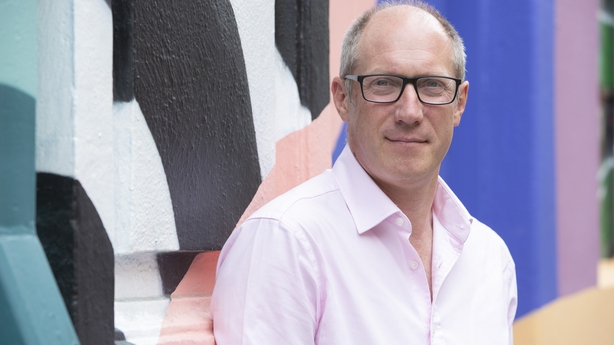Crowdfunding has grown in popularity right across the world in recent years.
The practice involves a large number of people contributing small amounts of money to fund a project or venture.
Until last month, the crowdfunding sector in Ireland had been unregulated.
But new EU rules being enforced here by the Central Bank, mean some big changes are on the way for the sector.
With this in mind, we've been finding out why crowdfunding is a popular option for small businesses, and what impact the new rules will have on service providers and investors.
What's the Scór?
Former Galway hurler Paul Flaherty started his business 'What's the Scór?’ back in 2019.
"It is a nice, easy app for the GAA fan to get their scores on the one platform," he explained.
The app provides live scores for both inter-county and club games, and has grown considerably in the last two years.
"Last year we had over 300 clubs using our platform, and we have over 135,000 downloads," Mr Flaherty said.

In order to expand the business, the team opted for crowdfunding – which Mr Flaherty said was the perfect fit for the business.
"We decided to go with crowdfunding because firstly, it allowed our GAA community to be a part of the app.
"And secondly, those who had already been using the app for the last two years could come along on the journey," he explained.
We need your consent to load this rte-player contentWe use rte-player to manage extra content that can set cookies on your device and collect data about your activity. Please review their details and accept them to load the content.Manage Preferences
Spark
Crowdfunding is carried out by companies like ‘Spark Crowdfunding’, which act as the link between the investor, and the project or company being funded.
"I had seen the rise of equity crowdfunding in the states and in the UK - and I thought well why doesn’t it exist here?," said Chris Burge, who set up Spark Crowdfunding around three and a half years ago.
"At the time and still now, the banks weren’t really lending very freely to young start up companies and they were really being hamstrung for that.
"So equity crowdfunding is just another mechanism by which to get money from investors through to investees, to start up companies to help them grow and help them prosper," he explained.

Spark now has eight and a half thousand investors on its database – and so far has raised funds for 27 companies.
"We have investors of all different shapes and sizes on our platform," he said.
"Some invest small amounts - and you can invest from as little as 100 euro on the Spark site, but others invest multiple tens of thousands on the site.
"So, we have some high net worth on there, but we also have lots of retail investors who are not professionals."
Until this year, the crowdfunding sector in Ireland had been unregulated.
But just last month, the Central Bank of Ireland started to enforce new rules.
"It may certainly be the case that the good standards that we are bringing in in this regulation have already been in operation," said Gerry Cross, Director of Financial Regulation, Policy and Risk at the Central Bank.
In short, Mr Cross said the new rules do three things.
"Firstly, they ensure that crowdfunding platforms are well run, with sufficient funds and by individuals who are fit and proper to run them - and from now on these platforms need to be authorised and supervised by the Central Bank.
"Secondly, they ensure that people who are thinking of investing are given good, clear information about what they will be investing in and about the risks.
"And thirdly, they require that the crowdfunding platform takes key measures to make sure that people do not invest in things that are not suitable for them," he explained.
The new crowdfunding rules are part of an EU regulatory framework.
This means that the same rules are being applied right across Europe, and service providers here, will now be able to operate outside of Ireland - something Chris Burge from Spark Crowdfunding is keen to pursue.
"Absolutely yeah, we do have plans to expand beyond Ireland," he said.
"We can operate across the EU 27 very easily from that point on, we get our passport so we can operate in Estonia or France or Sweden - or wherever it happens to be," he added.
Mr Cross of the Central Bank said the EU regulatory framework is designed to foster cross-border crowdfunding services.
"It is really important that there is the same level of protection across Europe.
"Now, investors in France and consumers in Denmark can be confident that crowdfunding platforms are meeting the same good standards, wherever they happen to be located," he said.
The road to regulation
The road to regulating the sector has been a long one, with Ireland well behind the UK and US markets.
Back in 2018, Finance Minister Paschal Donohoe said he would start working on the regulation.
However, a decision was made to wait for the EU regulations, which came into effect last November.
Mr Cross said he believes it made good sense for Ireland to follow the European lead and timing in this regard.
"I think it makes a lot of sense that we have aligned ourselves with the EU developments and timing.
"And it makes good sense that the regulation which has been driven by Europe takes place now - just at the moment when this crowdfunding sector is beginning to grow and develop here and elsewhere," he added.







